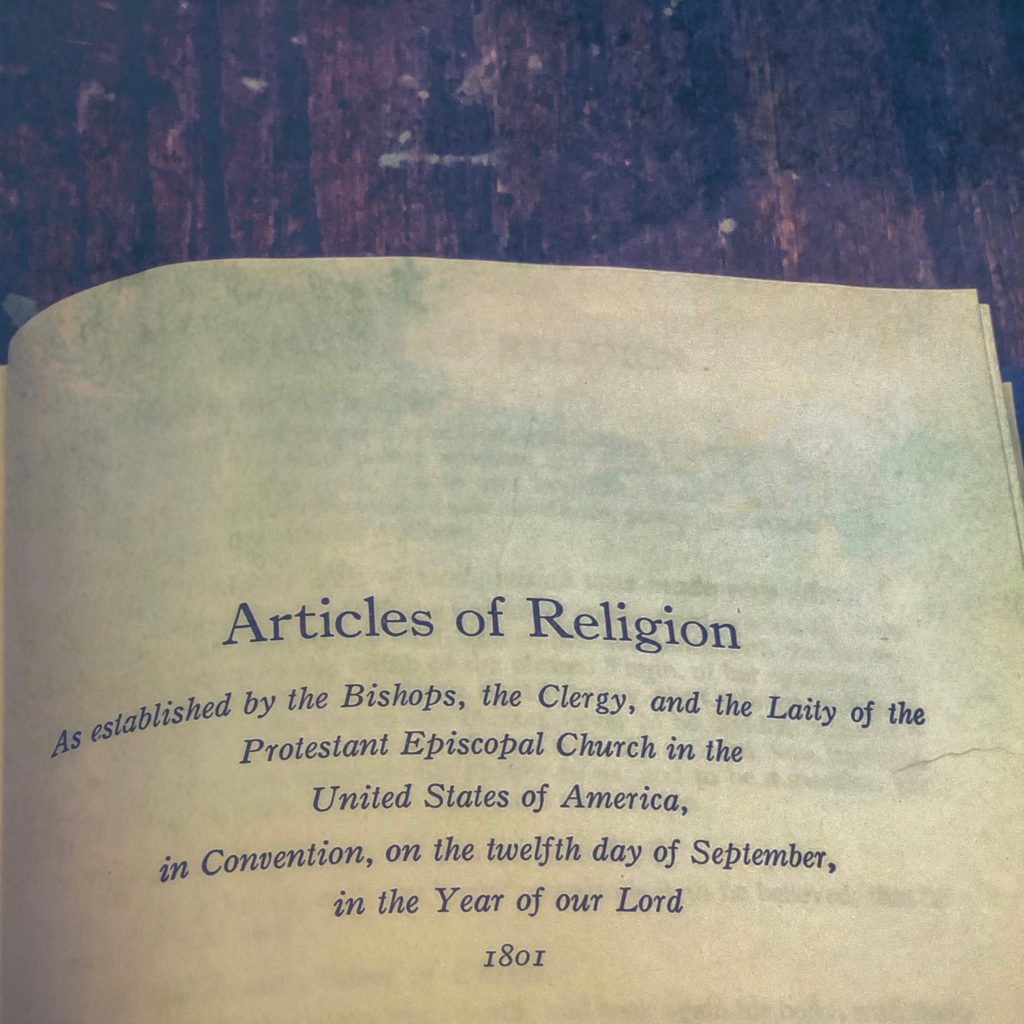
THAT person which by open denunciation of the Church is rightly cut off from the unity of the Church, and excommunicated, ought to be taken of the whole multitude of the faithful, as an Heathen and Publican, until he be openly reconciled by penance, and received into the Church by a Judge that hath authority thereunto.
by the Rev. Sam McNally-Cross
The Anglican Church, it is sometimes said, is the soft option. The choice for those that cannot handle the rigours of the Religion of Roman Catholicism and therefore secrete themselves in the flabby, pale confines of this peculiar English Church (although now with an international reach) – but the Articles of Religion, those thirty nine assertions, decrees, rules, if you will, show that this Church is anything but soft, flabby and undemanding. Perhaps none more so than Article 33 detailing how one must deal with excommunicate persons.
There is not found within this, or the other Articles, an exhaustive list of those acts which might render someone excommunicate. This Article informs how they must be dealt with but not how they have got to that state in the first place. In order to find the answer to this, we must do some further digging: A rubric at the beginning of the Service of Holy Communion in the Book of Common Prayer brings out a ‘lesser excommunication’ – for those that are in ‘malicious and open contention with his neighbours, or other grave and open sin without repentance’ – the noted emphasis on the need for repentance is again found in the text of this Article – ‘until he be openly reconciled by penance’.
Excommunication, therefore, is not a power bestowed upon the priest as leverage for his own convictions but to draw the excommunicant back into the Body of Christ, through repentance.
Interestingly, unlike the Roman Catholic Church, there seem to have been very few formal and notable excommunications in the Anglian Church. A quick search online provides no more than eight examples, and the reasons given shed further light onto what purpose this Article serves.
John Blakiston in the 1600s was excommunicated, he was noted to be a fervent supporter of the Puritans and an anti-Episcopalian, but the final straw came when his name appeared as one of the signatories of the fifty-nine that condemned King Charles the Martyr to death. Regicide seems an appropriate reason for excommunication alone, but his campaigning against the Church of England cannot of gone unnoticed.
Robert Cushman, the famed instigator of the Mayflower Voyage to the New World was excommunicated three times before his departure. Firstly, because he had not attended his parish church. Only upon proving that he was not being edified within said church was his excommunication lifted. Secondly, he was excommunicated for pasting up libellous tracts about the doctrines of the Church of England; he was absolved later at his request (suggesting repentance) but then, finally, was informed upon by his brother-in-law that he held views about predestination that were contrary to the doctrine of the Church.
Oliver Heywood and Henry Wilkinson both broke the Uniformity Act by refusing to use the Book of Common Prayer and were excommunicated, Lord George Gordon refused to bear witness in an ecclesiastical trial at the order of the Archbishop of Canterbury, Thomas Quiney, the husband of Judith Shakespeare, William’s daughter, didn’t obtain the correct license to marry and was briefly excommunicated. Victorian photographer Francis Meadow Sutcliffe produced a photograph called ‘Water Rats’ which featured naked children playing in a boat – he was excommunicated for displaying it as it was thought it would ‘corrupt.’
The reasons for these excommunications are varied – from the serious participation in the deliberate murder of a monarch to the failure to obtain a correct document for a marriage. Some seem never to have been lifted, others have on several occasions, but for all cases the underlying reason is church order and discipline.
The Christian faith is a daily journey toward God, to reconciling with and through Christ, the Church as His body is both the framework and the provider of the means for that to occur. As Article 19 states:
‘in the which the pure Word of God is preached, and the Sacraments be duly ministered according to Christ’s ordinance in all those things that of necessity are requisite to the same.’
It is therefore most important that the Church be preserved, as far as humanly possible, from false teaching and from those beliefs and acts that, given time to grow, would manifest dissent and undermine all that the church holds to be true. What, then, of the seemingly petty instances where Lord Gordon does not do as the Archbishop asks or Quiney neglects to obtain a correct license? When I read these words my mind turns, as it often does, to The Rule of S. Benedict. In Chapter five ‘monastic obedience’ the Holy Father writes;
‘If obedience is given with a bad will and with murmuring not only in words but even in bitterness of heart, then even though the command may be externally fulfilled it will not be accepted by God, for he can see the resistance in the heart of the murmurer’
Benedict understood that this hardness of heart would infect the brothers of the community and make it impossible to govern, but, more seriously, impossible to progress spiritually, producing, as it would, bad soil for the growth of faith. How much more then does open dissent against those in authority, false teaching, or failure to adhere to conduct becoming of a member of that body going to damage the whole?
For those in authority, that wield the power of excommucation, the considerations have to be two-fold. Firstly, the person in wilful rebellion needs to be corrected and brought back into the fold, that there are so few notable cases of excommunication in the Anglican Church suggests that this is used sparingly, a last resort, a final attempt to draw the poison out through repentance and allow a swift return to the Church. After all the soul of the individual is at stake, and the minister of the Church will be held accountable for those in his care on the day of judgement.
Secondly, there is a responsibility to the wider congregation, locally and universally, to protect them from error and to promote to them all that is good, right and true. But we are all members of that body and it does not fall solely to the ministers to protect others – granted that they take a lion’s share of the responsibility, through their conduct, through the way they engage with and live out their faith, through teaching, preaching the word and administering the sacraments mainly, and through excommunication when necessary as we have discussed – but the Article says that the individual excommunicated;
‘ought to be taken of the whole multitude of the faithful, as an Heathen and Publican, until he be openly reconciled by penance,’
There is a degree to which each faithful member of the Church is to regard those who have erred with such severity that excommunication has occurred as heathen, outside of the ranks of the Christian Church or a Publican. That latter word has, evidently, changed meaning – as we are not required to have an especially dim view of an innkeeper by virtue of their occupation – but the word in Greek, transliterated, is telones, a gatherer of taxes or tolls.
Through the New Testament we see these men (for they always were men) as examples of those who are distinctly lacking in any virtue. They are despised by the Jews, partly because of their occupation in the employ of the Romans, but mainly because they are considered for the most part cheats, liars and thieves, taking more than the tax required to line their own pocket. So this Article says that we are to have an especially dim view of those who are excommunicated. This has lead to some Christian and Pseudo-Christian groups partaking in a practice of shunning: completely cutting off those who are excommunicated, out of Church, out of mind. Even when it is your own family members.
I don’t see that instruction in this Article, either implicitly or explicitly. The phrasing ‘ought to be taken’ suggests perhaps a cool regard, a suspicion, a wariness that these individuals have acted in ways that are contrary to faith or hold beliefs that are outside of the scope of the doctrine of the Church. Be cautious of what they say, lest they lead you on the wrong path also.
The reason I do not read this as an inference of the practice of shunning is because of one particular word, ‘until’: ‘Until he be openly reconciled by penance,’ the Article says. Excommunication is not to be a permanent state (unless, of course, the individual refuses to be reconciled) but a journey back down the path wrongly taken, back to the fork in the road and a change of direction. During the process of excommunication it is right to be wary of said individuals for the preservation of our own soul and the good of the community at large, but it is not a severing of contact. The door remains, not just unlocked but ajar, ready to be pushed open by the penitent that they may be welcomed warmly back in as the prodigal son returning from the pig farm.
Finally, this repentance must be done ‘openly.’ When someone is excommunicate it is because their actions have a wider effect. It is not simply a matter between their own soul and God, else that could and would be dealt with by confession, by absolutions and by the grace of the sacrament. Excommunication acknowledges a break down in the Body of Christ, a wounding by one individual to the larger group, by one faction upon the whole. So the repentance must be openly shown, not for the purposes of shame or to heap guilt upon guilt but to restore the fractures that were the result of the actions that brought excommunication.
It is not just the individual that grows through excommunication, it is the whole church, as they too are given the opportunity to show true forgiveness, just as God does and just as we have all experienced from Him in our daily lives.
The Rev. Sam McNally-Cross is an Anglican Priest in the Church of England, serving in the Diocese of London. Particular research interests in Christian Spirituality, Monastic Life and Monastic Spirituality. An author of poems found at: https://liturgicalpoetry.wordpress.com and currently working on a commentary of The Rule of St Benedict: https://stonycliffsrockbadgers.wordpress.com
